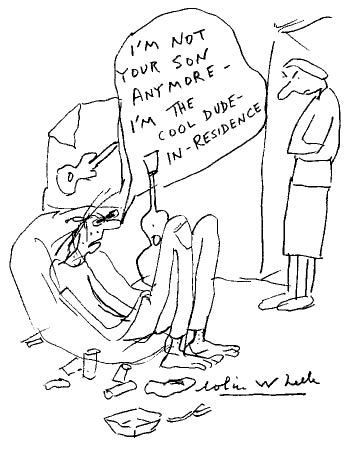My first — and so far only — proper job in journalism was, many years ago, as a staff writer on a kids’ computer-games magazine.
My first — and so far only — proper job in journalism was, many years ago, as a staff writer on a kids’ computer-games magazine. We were pretty good for what we were, but if we had a flaw it was that we were obsessed, absurdly and often fruitlessly, with being the first magazine to feature some new game that absolutely no one was talking about, usually because they hadn’t finished writing it yet.
It was my introduction to a particular kind of journalistic mindset: the belief that what is new, what is now, is intrinsically more fascinating than anything else. Have you heard blah blah band? Have you seen blah blah film? I can think of at least one Sunday broadsheet whose entire editorial policy seems to be based on fear of not missing what everyone else thinks is cool or the latest thing. Reading it just makes me feel anxious, although I imagine not half as anxious as the people who have to write it.
Pop music, of course, is the worst offender in this. A business that pretends it’s an artform, or an artform that wants more money and wants it now, it’s constantly dangling exciting new talents in front of us and waiting for us to nibble. At this time of year there aren’t many new records out, so instead ‘the buzz’ is all about who is going to be big in 2011.
It’s convenient that the journalistic hunger for novelty should coincide so neatly with the requirements of record company marketing departments. This year’s tip is a mouthy young woman called Jessie J, who has great hair, an annoying voice and as yet no songs. Last year it was Ellie Goulding, who did an interesting cover of Elton John’s ‘Your Song’ but not a lot else. Who decides these things? Would they like to place their head in this mangle? Don’t worry, it won’t hurt a bit.
The process doesn’t even do that much for the young artists concerned. Expectations are constantly being raised to untenable levels, and if the first record isn’t quite good enough, how strong do you have to be to recover from that? Lucky are the older artists who have had time to hone their craft in honest semi-obscurity.
For months I have been listening to Richard Hawley’s Truelove’s Gutter (Mute) from 2009. This is the Sheffield troubadour’s eighth album of slow, bluesy, pre-rock’n’roll croonage, but, while it’s recognisably the same thing he has done before, it’s slower, quieter and infinitely bolder than anything he has done before. Two of the eight songs are more than nine minutes long, but they both work in the way Neil Young’s long songs work, starting with simple structures and then slowly, patiently building up with such determination that the inevitable guitar solo makes you shudder with pleasure. And that’s on the 25th listening as well as the first.
Hawley was Pulp’s second guitarist once upon a time, and his solo career has passed through the usual states: critical approval, cult success, Mercury award nomination, greater confidence, radio play, records that sell more but are listened to less, a slight coarsening of the formula and now, bang! the record he obviously wanted to make all along but previously didn’t know how to. Hawley would never have been ‘tipped’ by industry bigwigs to be a star in this or any other year: he is well into his forties and has a face like a squished tomato. And what’s better than that? Possibly four squished tomatoes.
My other favourite of the moment is Stackridge’s 2009 comeback album, A Victory For Common Sense (Helium), whose cover is adorned by the four group members, none of whom will see 55 again. In their 1970s heyday, Stackridge were a byword for English whimsy and multiple line-up changes. For this album the writing core of Andy Davis, James Warren, ‘Mutter’ Slater and ‘Crun’ Walter have reconvened, and their record is a masterclass in classic rock songwriting, with tunes you hadn’t realised you hadn’t heard before, some great weary old singing and lyrics exploring, in a variety of ways and tones, what it means to be English. Wonderful guitar solos, by the way, from Andy Davis. You hadn’t heard of it? Of course not. It’s not the new thing, it’s not the now thing, and Stackridge aren’t going to be big in 2011, or even medium-sized. All they can be, on this evidence, is magnificently good. I just hope that’s enough for them.





Comments